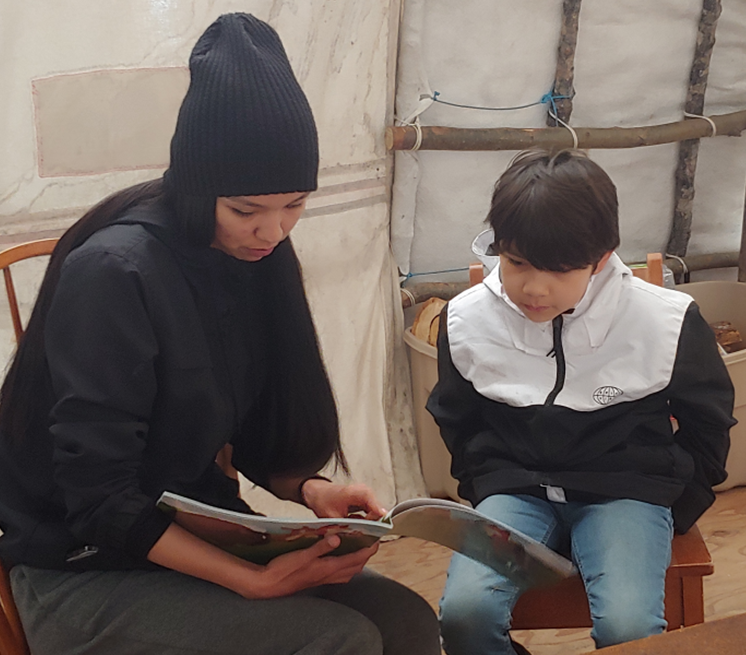The ninth summer of children’s literacy camps in Eeyou Istchee was celebrated as a return towards normalcy after a limited pandemic version last year. For four weeks in July, Frontier College organized summer learning opportunities for a total of 158 children in Whapmagoostui, Chisasibi, Wemindji, Waskaganish, Mistissini and Waswanipi.
“This summer reflected the sense across the world, where things are slowly getting back to normal,” said program manager Mark Anto. “It was a step back to hopefully having full programming next year. This was kind of a transition year, a hybrid between the scaled-back 2020 model and what we would see next summer.”
While the camps are normally run in all nine Cree communities, there was a last-minute rush in 2020 to establish at least basic activities in three centres. As planning for this year’s edition began in January before vaccinations began, there remained uncertainty about existing restrictions.
“The challenge this summer was having enough counsellors to run these activities,” Anto told the Nation. “In some communities, we scaled back with a mix of online and in-person activities. It’s a testament to the flexibility of the model. What resources do we have, what can we do that’s best for the kids and how do we execute it?”
Like last year, the summer camps relied entirely on local counsellors, who were provided a valuable opportunity to improve their teaching skills and self-confidence. Training for the 24 counsellors was once again held online, with the many returning staff enabling stability and knowledge of best practices.
“It’s just navigating the variety of resources and working closely with the learner to make sure they understand the material,” explained Anto. “If online work is done with the right support, it can be as effective as in-person work. Life throws you challenges – let’s find ways to make it better.”
One focus of the camps is to ensure children get outside and stay active. Educators worry that too much time inside hinders development, so literacy camps feature games of alphabet dodgeball or tag in which kids must spell a word.
“A lot of kids coming to camp are five- or six-year-olds,” Anto shared. “You can’t get them to read six hours a day. They want to run around. Learning and literacy are embedded in all those physical and social activities.”
While the camps are open to children up to 12, the majority were five-to-eight-year-olds. Activities were adapted according to the ability of participants, including individual and group readings. Older children would be encouraged to write in journals and had board game and trivia activities during the evening.

“Our goal is to get the younger kids to read or be read to a minimum of 15 minutes a day, which all the studies recommend is enough to prevent summer learning loss,” said Anto. “Individual work, one-on-one as much as possible, is really important.”
In partnership with the Cree School Board, camp organizers look at test scores and work with teachers to determine whether the children’s literacy is improving. Anecdotal feedback suggests that kids who attended camp are more eager to read and better maintain their reading ability over the summer.
As educators better understand how the pandemic has impacted development, Anto hopes to focus learning initiatives on those elements that have been particularly affected. This is critical for children who are just learning to read but have fallen behind.
“We’re trying to respond as an organization to the biggest impacts of the pandemic,” Anto said. “By Grade 3 it’s really important to have reading down – it’s difficult to catch up after that point. It’s going to be important to double down to help them if they’ve fallen behind. There are some tweaks we could do to address those gaps.”
Next year’s programming will expand the involvement of community members, including through online contests aligned with themed weeks at camp. There were 54 guest speakers this summer, including former Youth Grand Chief Kaitlyn Hester-Moses and Theresa Georgekish, who gave a presentation on Cree language storytelling.
Campers also participated in cultural festivals, including Wemindji’s birthday celebration and Old Factory visit, and Waswanipi Days. Frontier College distributed 1,764 free books, including several by Indigenous authors.
“We’re very happy, honoured and grateful that both the Cree School Board and the communities have stuck with the project despite this incredible curveball that was thrown at all of us last year,” said Anto. “It’s a beautiful sign of resilience. Next summer we’ll be back to a full camp so parents can count on that programming for a month.”





